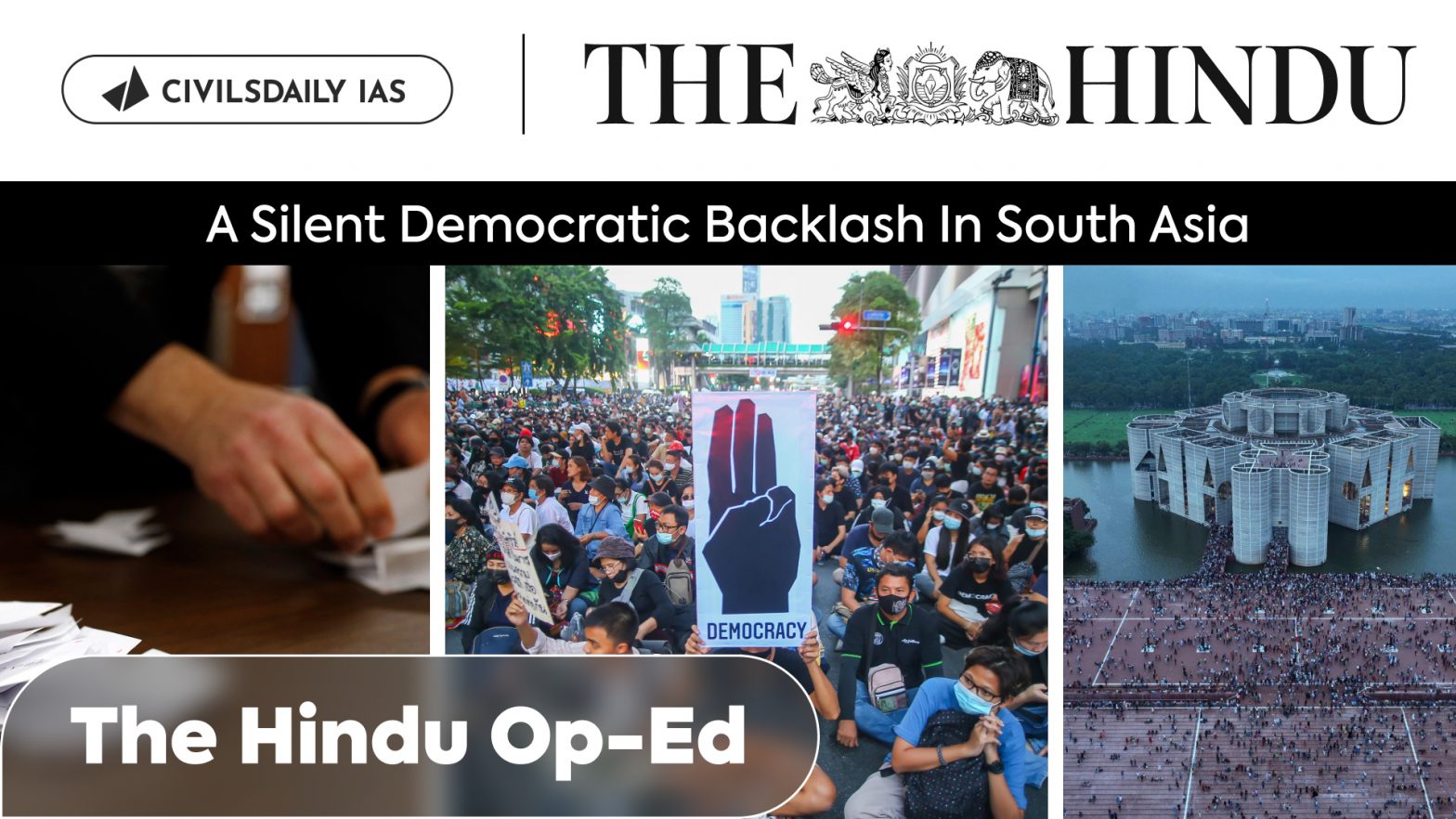| PYQ Relevance: Q The proposed withdrawal of the International Security Assistance Force (ISAF) from Afghanistan in 2014 is fraught with major security implications for the region’s countries. Examine in light of the fact that India is faced with a plethora of challenges and needs to safeguard its own strategic interests. (UPSC IAS/2013) Q ‘India is an age-old friend of Sri Lanka.’ Discuss India’s role in the recent political crisis in Sri Lanka in the light of the preceding statement. (UPSC IAS/2022) |
Mentor comment: The political landscape in countries like India, Pakistan, and Bangladesh, where governments have faced criticism for undermining democratic institutions and processes. Elections in Bangladesh (January 7, 2024) resulted in PM Sheikh Hasina securing a fourth consecutive term. However, the elections were widely condemned by boycotting, demanding a caretaker government to oversee the electoral process. Similarly in Pakistan, the elections (February 8, 2024), were marred by allegations of irregularities and military influence. International observers and analysts have raised alarms about the military’s increasing control over political processes, which has led to Pakistan being classified as an authoritarian regime by the Economist Intelligence Unit.
This backlash may be attributed to various factors, including economic challenges, social unrest, and the manipulation of electoral systems, which have led to a deterioration of public trust in democratic norms and practices. Today’s editorial emphasizes the importance of recognizing these trends as they pose risks to the stability and future of democracy in South Asia, urging a reevaluation of the political dynamics at play in the region.
Let’s learn!
__
Why in the News?
South Asian region is experiencing a subtle yet significant backlash against democratic governance, characterized by increasing authoritarian tendencies and a decline in civil liberties.
On Emerging Democratic Backlash in India and Pakistan:
- Middle-Class Attitudes: Historically, the middle classes in both countries have shown ambivalence towards democracy, sometimes favoring military rule, though a younger generation in Pakistan is becoming critical of military involvement in politics.
- Presently, in India, there has been a democratic pushback against the BJP’s authoritarianism. People also fought against the dictatorship during the Emergency in 1975.
- In Pakistan, the PTI emerged as a major political force, resonating with public sentiment against military influence, despite state machinery working against it.
- Digital Backlash: Both countries are witnessing a silent democratic backlash, with citizens utilizing digital platforms and electoral participation to reclaim democratic spaces.
What are the main causes of the democratic backlash in South Asia?
- Authoritarian Tendencies: The noticeable shift towards authoritarianism is often characterized by the erosion of civil liberties, media suppression, and the undermining of democratic institutions.
- For example, in India, the Modi government has been accused of implementing divisive policies and attacking minority rights, leading to a downgrade in its democratic status.
- Electoral Integrity Issues: In Bangladesh, the 2024 elections were described as a “sham” and Pakistan’s elections faced accusations of military interference and manipulation, particularly against the Pakistan Tehreek-e-Insaf (PTI) party.
- Polarization and Social Unrest: Politically, there are rising tensions between various social and ethnic groups. This leads to social unrest and can create an environment where authoritarian measures are justified as necessary for maintaining order.
- Political Culture: In India, the middle class has at times expressed a preference for authoritarian rule when faced with perceived chaos, reflecting a complex relationship with democracy.
- Similarly in Pakistan, the military’s historical role in politics has fostered a culture where military intervention is sometimes seen as a stabilizing force.
- Economic Challenges: Issues such as poverty and unemployment exacerbate political discontent and can lead citizens to support more authoritarian governance as a means of achieving stability and order.
| Pakistan towards authoritarianism since its inception: • 1971 Events: Major protests led to significant political changes, including the first general election in 1970 and the eventual disintegration of East Pakistan in 1971, countering military intentions. • 2008 Events: Since 2008, Pakistan has experienced a relative transition to democracy with four general elections, but this has been met with military pushback. • Present Dynamics: Recent elections (2018 and 2024) reveal a troubling trend of political elites forming alliances with the military, undermining democratic processes and targeting political opponents. India’s Democratic Trajectory: • 1975 Events: India was seen as a model democracy with a history of free elections and separation of powers, barring the Emergency period in 1975. •Since 2014: Indian Politics marked a shift towards an authoritarian model of governance characterized by executive overreach and a campaign for an “Opposition-free democracy”. •Judicial Activism and Overreach: Judicial activism has played a role in protecting rights and promoting social justice in India, filling legislative vacuums and enhancing administrative efficiency. However, judicial overreach can undermine parliamentary democracy by interfering with the functioning of the legislative and executive branches, damaging the balance between organs of government. |
Implication for South Asia
- Silent democratic backlash: Factors like authoritarian tendencies, electoral integrity issues, military influence, economic challenges, and social unrest have contributed to the erosion of democratic norms and public trust in the region.
- The international community has expressed concerns about the deteriorating state of democracy in South Asia, particularly in Pakistan where the military’s influence has led to its classification as an authoritarian regime.
Conclusion: As citizens in both countries increasingly advocate for democratic governance, it is crucial to observe how these movements evolve, particularly in Pakistan, where the political landscape is more volatile.
https://www.thehindu.com/opinion/lead/a-silent-democratic-backlash-in-south-asia/article68577856.ece

